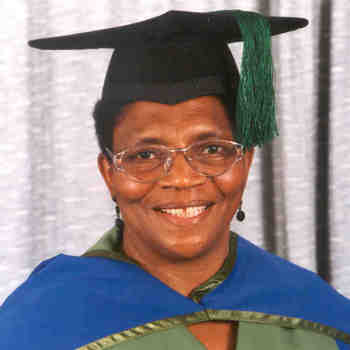DOCTOR OF NURSING (HONORIS CAUSA)

Lillian Cingo was born on the 30th of June 1938, in a rural area of the Eastern Cape. Her dedication to the improvement of both the physical and mental health of the poor has marked her as an outstanding and dedicated South African.
Cingo inherited her compassion from her mother, who cared for the ill and injured in her community in the absence of any kind of medical facility. Cingo’s degrees in Tropical Medicine and Clinical Psychology (which she earned while in exile in London) together with her work there as a specialist nurse, meant that on her return to South Africa in 1994, she was well placed to continue her crusade for better health services.
Until 2008, she was the joint Manager of the Phelophepa Health Train. Phelophepa is a Sotho/Tswana word meaning “good, clean health”. The 18-coach train travels some 15 000km annually, providing optometry, dental, psychological, educational and pharmaceutical services to rural communities and reaches over 280 000 people per year. From 1995 until she retired, she spent nine months of every year aboard the train as it wound its way through some of South Africa’s most remote areas, many of them kilometers way from even the most basic of health services. Dozens of people camp out overnight by the railway line in order to receive treatment. As Cingo says, “Every day had its own emotions and lessons. I learned so much about the generosity of spirit of rural people in spite of not having much. It was a give-and-take relationship”.
For her next project she intends to concentrate on providing mobile clinics for migrant workers in the mining industry. She has been the recipient of numerous awards in recognition of her commitment to the service of and compassion for the thousands of patients she has treated over the years.
Lillian Cingo received an honorary doctorate from the former University of Port Elizabeth in 2000, in recognition of her outstanding contribution to the improvement of primary healthcare in South Africa’s rural areas.